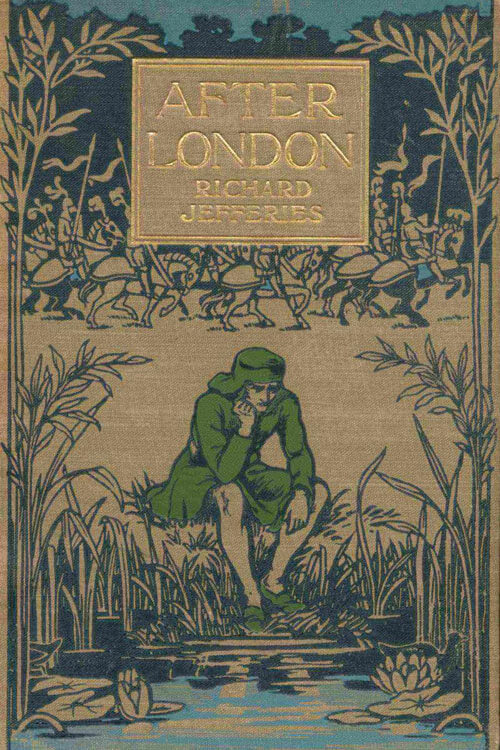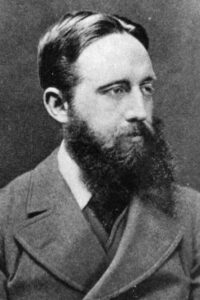
After London
There was no sword or lance. Indeed, of all these weapons and implements, none seemed in use to judge by the dust that had gathered upon them and the rusted edges except the bow and crossbow and one of the boar spears. The bed itself was shallow, framed of wood, thick and solid; the clothes were of the coarsest linen and wool; there were furs for warmth in winter, but these were not required in May. There was no carpet or substitute for it; the walls were whitewashed, the ceiling was none, the worm-eaten rafters were visible, and the roof-tree. But on the table was a large earthenware bowl full of meadow orchids, blue-bells, and a bunch of may in flower.
His hat, broad in the brim, lay on the floor; his doublet was on the wooden block or seat, with the long tight-fitting trousers, which showed every limb muscle, and by them high shoes of tanned but unblacked leather. His short cloak hung on a wooden peg against the door, fastened with a broad oak bolt. The parchment in the recess of the window at which he had been working just before retiring was covered with rough sketches, evidently sections of a design for a ship or galley propelled by oars.
The square spot of light upon the wall slowly moved as the sun rose higher till the ivory cross was left in shadow, but still, the slumberer slept on, heedless, too, of the twittering of the swallows under the eaves and the call of the cuckoo not far distant.
Read or download Book
Richard Jefferies
John Richard Jefferies (November 6 1848 – August 14 1887) was an English nature writer noted for his depiction of English rural life in essays, books of natural history, and novels. His childhood on a small Wiltshire farm significantly influenced him and provided the background to all his significant works of fiction.
Biography.
Jefferies’s corpus of writings covers a range of genres and topics, including Bevis (1882), a classic children’s book, and After London (1885), a work of science fiction. For much of his adult life, he suffered from tuberculosis, and his struggles with illness and poverty also played a role in his writing. Jefferies valued and cultivated an intensity of feeling in his experience of the world around him, a cultivation that he describes in detail in The Story of My Heart (1883). This work, an introspective depiction of his thoughts and feelings about the world, gained him the reputation of a nature mystic at the time. Still, his success in conveying his awareness of nature and people within it, both in his fiction and in essay collections such as The Amateur Poacher (1879) and Round About a Great Estate (1880), has drawn most admirers. Walter Besant wrote of his reaction on first reading Jefferies: “Why, we must have been blind all our lives; here were the most wonderful things possible going on under our very noses, but we saw them not.”
Life and works
Early life
While in Swindon, Jefferies had found it challenging to seek publication or employment with London publishers, and early in 1877, with Jessie and their baby son Harold, he moved to a house at what is now 296 Ewell Road, Tolworth, near Surbiton. (A wooden plaque commemorating this is found at the entrance to Surbiton Library.) The area was then at the limits of London’s growth. Jefferies spent much time wandering through the nearby countryside; these walks would later provide the material for Nature Near London (1883).
The Surbiton years were momentous. The couple’s next child, a daughter called Jessie after her mother (but known by her second name, Phyllis), was born (on December 6, 1880), and Jefferies finally began to make his name. His new surroundings defined him as a country writer, both to himself and others. Articles drawing on Jefferies’s Wiltshire experiences found a ready market in The Pall Mall Gazette. First came a series of essays based on his friendship with the keeper of the Burderop estate near Coate, The Gamekeeper at Home, collected as a book in 1878. The book was well received, and Jefferies was compared with the great English nature writer Gilbert White. Three more collections followed the same pattern of publication in The Pall Mall Gazette and then in book form: Wild Life in a Southern County: The Amateur Poacher (1879) and Round About a Great Estate (1880). Another collection, Hodge and his Masters (1880) brought together articles that were first published in the Standard. In the few years that Jefferies took to write these essays, his literary skill developed rapidly: The Amateur Poacher, in particular, is regarded as a significant advance on the earlier works, the first in which he approaches the autobiographical subject matter that is behind his best works. A minor novel, Greene Ferne Farm (1880), was the first to gain recognition from contemporaries and later scholarship.
First successes
The Surbiton years were momentous. The couple’s next child, a daughter called Jessie after her mother (but known by her second name, Phyllis), was born (on December 6, 1880), and Jefferies finally began to make his name. His new surroundings defined him as a country writer, both to himself and others. Articles drawing on Jefferies’s Wiltshire experiences found a ready market in The Pall Mall Gazette. First came a series of essays based on his friendship with the keeper of the Burderop estate near Coate, The Gamekeeper at Home, collected as a book in 1878. The book was well received, and Jefferies was compared with the great English nature writer Gilbert White. Three more collections followed the same pattern of publication in The Pall Mall Gazette and then in book form: Wild Life in a Southern County: The Amateur Poacher (1879) and Round About a Great Estate (1880). Another collection, Hodge and his Masters (1880) brought together articles that were first published in the Standard. In the few years that Jefferies took to write these essays, his literary skill developed rapidly: The Amateur Poacher, in particular, is regarded as a significant advance on the earlier works, the first in which he approaches the autobiographical subject matter that is behind his best works. A minor novel, Greene Ferne Farm (1880), was the first to gain recognition from contemporaries and later scholarship.
Final years
After Eltham, Jefferies lived briefly in various parts of Sussex, first at Rotherfield, then in a house on Crowborough Hill. In Crowborough, Jefferies completed his most ambitious and unusual novel, Amaryllis, at the Fair (1887). Closely based on his own family at Coate, it describes a farm and a family imperceptibly approaching disaster. There is little narrative development; significant or typical moments are presented in short scenes or tableaux.






